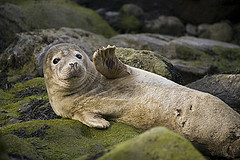I thought you might enjoy this. I wrote it a couple of years ago. Two different magazines bought it and then un-bought it. Maybe that means you’re supposed to be reading it now. I find this a joy-filled tribute to “mixed marriages”—people coming together with different ways of seeing things and making it work. It is sad as I read it over now, however, because I mention my husband’s “three children.” One of them, James, passed away in 2007 at age sixteen. I wish with every breath that he was still here, even though I know he’s helping to light up heaven.
I wasn’t weird, just uncommon. Unchained by convention. A free thinker.
I home-schooled my only child, a daughter, so there would be time to see the world. We saw it. We even met the Dalai Lama. When not traveling, Rachael—she hadn’t started going by her middle name, Adair, yet—and I lived with four cats and a dog, all foundlings. We refrained from eating anything that had once had eyes, except for potatoes and those had to be organic–preferably sold out of the back of the farmer’s pick-up. I grew sprouts and juiced juice and spoke ill of famous soft drinks. The only thing in our house that was openly artificial was the Christmas tree: it just seemed mean to cut down a real one.
Our friends held similar views. They weren’t all vegetarians but they knew the meaning of tempeh and seitan. They talked about gas mileage and they reduced/reused/recycled back when we still thought granola was diet food. The people we knew were mostly artists of some sort–if not from 9 to 5, then the rest of the time. Politically they were liberal and socially they were activists. Rachael learned to carry a picket sign in her stroller.
Compared to people we knew who wouldn’t drive, or buy clothes that weren’t used, or watch TV–ever–we were the all-American single-parent family, or so I thought until William came along. His singles ad—we about a year early for Internet dating—showed stunning eloquence in twenty-five words or less: “Divorced man, lived abroad most of life, looking for woman who enjoys travel, music, art. Age and race unimportant.” Wow! Maybe he’d been in the Peace Corps.
William and I chose to rendezvous in a bagel shop. He said he’d met five of the thirty women who’d responded to his ad, but I was the first to bring non-dairy cream cheese. I learned that he hadn’t been in the Peace Corps, but maybe his being a software attorney had helped developing nations get email. He was so attractive and articulate that I barely noticed that he was drinking Coke.
In the stupor of infatuation followed by the blindness of love, I also missed that we inhabited different universes, until fourteen months later when we were newly married and freshly ensconced in the same house. I had five children, four with fur; he had three, all human. His lived with their mother but would spend weekends with us. It was going to be delightful.
William thought so, too. That’s why he gave me that grocery list, the one with all the party food, so we could celebrate the first Friday night his kids came. The list read:
• Oreos
• 3 Musketeers miniatures
• Potato chips
• Frozen pizzas
• Coke, Sprite, Sunny Delite
• Wonder Bread
• Lunchables
Okay, I could be flexible. This was a special occasion. “But, honey,” I asked, “what should I buy for their real food, I mean, other than for the party?” He said he didn’t know anything about a party; this was a grocery list. I wondered if only Catholics could get annulments.
I tried to act normal as I filled my shopping cart, but this was not normal. It was more like Halloween and I was masquerading as someone who knew what a Lunchable was. I put the molded-plastic-and-cardboard-packed rations into the cart, took off my jacket, and used it to camouflage both the Lunchables and the white bread, in case I saw somebody I knew.
Back home, I couldn’t keep the humiliation to myself. I had to call someone and share the shame of buying food made by corporations, and let her know there was toy weaponry in my pacifistic basement, and beer—“Not even wine, Carol: beer!”—in my fridge. I waited for her to say “How can you bear it?” She said instead, “The first year of a good marriage is the worst, and the first year of a bad marriage is the best.” Some friend. She also had a question for me: “Does William or do any of his children try to change you?”
“Well, no,” I told her (while thinking, “Why would they? I’m right.”).
“Then I’d say the biggest problem is your ego.” That one got me, as the truth tends to do. I wanted to cover my head the way I’d covered the Wonder Bread. Instead I put the groceries away and asked William if he wanted a beer.
We have now been married almost ten years, and Carol was right: in our good marriage, it just gets better. My husband credits me with helping him be healthier, more spiritual, and more creative. I owe to him the fact that I can write for more readers and speak to more conditions because he’s helped me see that there are lots of people out there who never get acupuncture or look forward to PBS pledge drives. We’re closer than we ever were. He knows me better than anybody. And he loves me as if I were the sort of person I hope I’ll one day be.
 This is a picture of William and me. He’s still cute and I’m still grateful.
This is a picture of William and me. He’s still cute and I’m still grateful.

